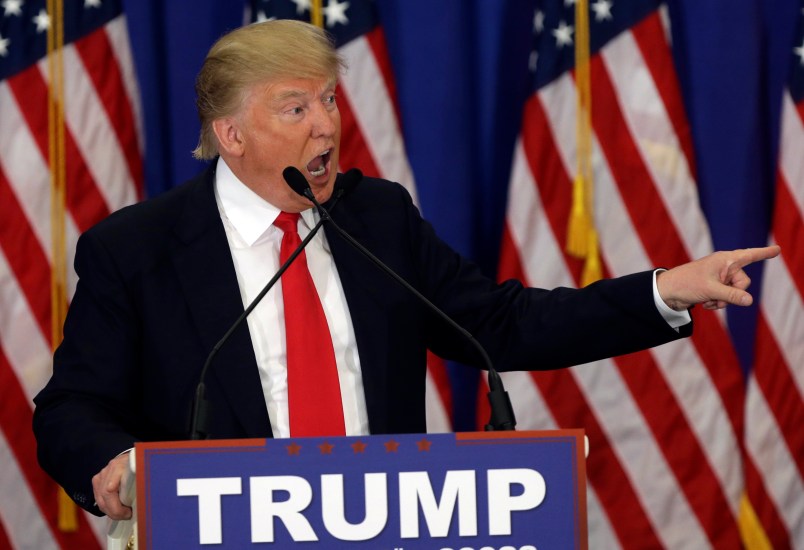WASHINGTON (AP) — Donald Trump says he has spent $30 million so far running for president, and his campaign manager says he’s never getting that money back.
As Trump brags about “self-funding” his surging Republican bid, he has been lending — rather than giving — money to his campaign. That has raised the question of whether his self-funding pledge has strings attached. Would he ever raise donor money to pay himself back?
Not a chance, says campaign manager Corey Lewandowski.
“He is not going to repay himself,” Lewandowski said in an interview this week with The Associated Press.
Trump, it turns out, is following the standard practice of wealthy candidates who use their own money for presidential campaigns, a review of Federal Election Commission records shows.
Just like Trump in 2016, Jon Huntsman in 2012, Mitt Romney in 2008 and Steve Forbes in 1996 each made multimillion-dollar loans to their presidential campaigns, which they never repaid.
“All campaign lawyers advise candidates to do these things as loans. I certainly do,” said Ben Ginsberg, a longtime Republican campaign attorney. That’s because once a candidate hands over a personal check as a contribution, there’s no way to ever recoup the money. “They’d all like to get paid back, if possible,” Ginsberg said.
And therein is the rub for the Trump campaign. Loans keep alive the possibility that Trump can make his money back from traditional donations later in the campaign, after months of reaping the political benefits of asserting he’s self-funding.
“I’m self-funding. I’m putting up my own money,” Trump says in one of several Facebook videos on the issue. “It’s something I don’t know that I’m given proper credit for, but you know what, I feel better about it because nobody has me. I’m working for you.”
Charlie Spies, a Republican campaign attorney and public Trump critic, said Trump’s use of campaign loans “sets up the ironic and potentially dishonest situation where he could end up using donated money to pay himself back.”
Bill Dal Col, who managed Forbes’ 1996 and 2000 presidential campaigns, said Forbes “announced right from the get-go that he wasn’t going to pay himself back” — something he said he’s surprised Trump has not done.
Forbes lent his 1996 campaign $38 million. (He used campaign contributions to reimburse himself for $490,000 of that amount, FEC documents show.) When Forbes ran four years later, he eschewed loans altogether, personally contributing $76 million to his failed cause.
“Is Trump expecting to get repaid? I kind of doubt it,” Ginsberg said.
Indeed, Lewandowski dismissed the possibility as “ridiculous.”
“We have said over and over, he’s self-funding,” Lewandowski said. “I don’t know how can pay yourself back with money you’re not raising.”
There’s nuance to that claim. While Trump has not held traditional fundraisers and lacks a financial team to solicit checks, his campaign website features a large, red “donate” button.
FEC records, current through the end of January, show Trump has raised $7.5 million from other people. In that same time period, he lent his campaign $17.5 million and directly contributed another $250,000.
Trump never mentions his other donors. He’s taking the opposite approach of most other self-funded candidates, who are usually eager to show they have substantial financial support from others.
After using personal loans in 2008, Romney, for example, relied on other donors when he ran in 2012. “The selling point of his second campaign was his ability to raise money,” Spies, who was a Romney supporter, said.
As he barrels toward the 2016 GOP nomination, Trump has been talking more about how he would pay for what would surely be a pricey general election. The cost of the presidential race four years ago topped $2 billion.
Trump says if he becomes the nominee, he would help raise money for the Republican Party, which, in turn, would help him try to win the White House. Yet at a press conference Saturday, he seemed to foreclose the possibility of raising money from donors even as a general election candidate. “I’m not looking for funds for myself,” he said.
If Trump changes his mind and ends up raising enough money, he has only until Election Day to repay his loans, said Bob Biersack, a senior fellow at the Center for Responsive Politics who was an FEC employee for 30 years.
After that time, FEC rules say candidates can repay themselves a maximum of $250,000.
Copyright 2016 The Associated Press. All rights reserved. This material may not be published, broadcast, rewritten or redistributed.







Trump is much smarter than all those other rich guys. He knows how to work a deal. We haven’t seen anything yet. You will see how smart he is. He has a huuuuggee amount of smarts when it comes to making a deal.
I’m confused (not unusual in itself, but particularly relative to this issue), I thought that there were limits on what individuals could contribute to a political campaign.
Bullshit. This is all bullshit. I guarantee he pays himself back. Yet another lie in a sea of them by this con-man.
I want to see the IRS sticking Trump if he doesn’t declare the value of the free air time he’s received from Fox…$30 Million through December of 2015. The last three months surely will account for millions more in air time as well.
http://mediamatters.org/blog/2016/01/12/fox-news-has-given-donald-trump-nearly-30-milli/207912
Look at that face. You can trust HIM! Would he lie?
http://all-len-all.com/wp-content/uploads/2016/01/trump-pinochio.jpg